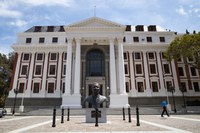Abortion Bill set to spark fierce debate in Parliament
The proposed amendments include mandatory pre-abortion counselling that will include ultrasound scans. The amendments also provide for the type of information that should be provided to women to help them make an informed choice regarding abortion. According to the Memorandum to the Bill, this may “include relevant information relating to the state of the development of the foetus, including electronic pictures, diagrams and photographs and information on the procedure of the termination among others.
The organisation Sonke Justice Network in its submission to Parliament argues Dudley’s Bill and especially proposals on mandatory counselling purports to help women make informed choices, but “in practice, it will hinder a woman’s freedom and right to bodily autonomy”. It labels the Bill as an attempt to place “procedural obstacles in the way of women seeking safe and lawful terminations of pregnancy, and thus violate their rights”. One of the amendments proposes an extra condition for terminating the pregnancy after 12 weeks. It proposes that a pregnancy “may be terminated from the 13th week up to and including the 20th week of the gestation period if a medical practitioner and a social worker, after consultation with the pregnant woman, believe the continued pregnancy would significantly affect the social or economic circumstances of the woman. In the current Bill, there is no provision for a social worker’s input in this determination of social or economic circumstances.
The Centre for Applied Legal Studies (CALS) in its submission argues the proposed ultrasound service would place an “extra burden on an already financially burdened healthcare system”. According to the CALS ultrasound machinery, albeit useful, is simply not a “foremost need when things such as medications, beds, sufficient staff and counselling in an already overburdened Public Health sector are limited”. CALS too, argues mandatory counselling can infringe on a woman’s autonomy to make her own decisions and should rather be voluntary.
Dudley, however, argues the bill aims to improve what is already there in law and the Constitution. “It is about protecting and ensuring a woman’s right to apply her mind to all the relevant facts. What is happening now is that people are pretending that what is happening is not there. It is ridiculous. For example, many of these abortions are not first-time abortions. They are often the second, third, or fourth abortion.” Dudley claims. “That points to the fact that people are not getting the connection between the baby and falling pregnant. So, this is part of the education and this is the most pertinent place to educate people on what is going on inside of them. That is why a sonar is important. It may well not stop that abortion, but it may stop a future pregnancy from casually happening.” According to Dudley, she is not saying women should not have a choice. They have the first 13 weeks of complete abortion on demand after all.”
There are some organisations like Sonke Justice Network who argues instead of creating legal impediments to women’s access to abortion, the focus should rather be on providing safer and more accessible abortion services in the public health sector. Yet minister of Health Aaron Motsoaledi in a parliamentary answer to questions on unsafe abortions admitted his department does not keep statistics of unsafe abortions and related consequences and does not have a concrete plan to deal with it other than working with the SAPS. Figures provided by the department show last year more than 97 000 abortions were performed in health facilities, up from the 87 000 in 2015. In its country factsheet, the organisation HEARD found an estimated 50% of abortions in South Africa already occur outside of designated health facilities.
This week's articles
NEWS ANALYSIS: Oversight no gentleman’s game
#Notourleaders: Parties given until February to respond to sexual harassment questions
Grant beneficiaries saved by the Court – again

